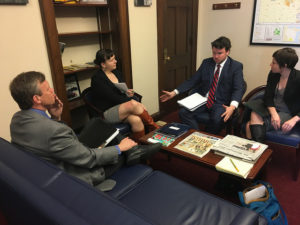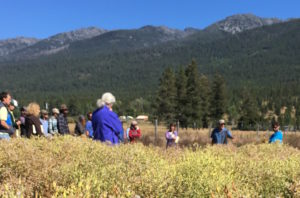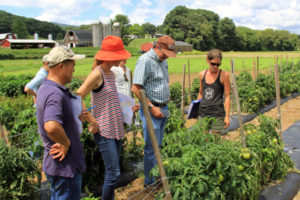
The Farm Bill is an enormous, nearly trillion dollar piece of legislation that governs many aspects of our food and farming system. It’s up for debate every five years or so and the current law is set to expire at the end of September. If it does, many critical programs, including those supporting organic farmers, will be left stranded with no funding.
That’s why policy advocates are working hard to influence and pass the next Farm Bill. Working with our partners at the National Organic Coalition and National Sustainable Agriculture Coalition (NSAC), Organic Seed Alliance is helping to advance legislation that goes beyond the status quo to establish fair and forward-looking initiatives that will positively impact the health of our environment, communities, local economies, and agricultural systems – from seed to food.
The House Agriculture Committee recently passed its version of the 2018 Farm Bill – the Agriculture and Nutrition Act of 2018 (H.R. 2) – along party lines. Though the bill includes a much-needed increase for organic research, the balance of the bill fails to support rural communities, local food systems, conservation programs, organic cost-share programs, and much more. Our friends at NSAC put together a summary of the bill’s failings here.
OSA’s priorities focus on reinvigorating regional, public plant breeding programs and directing more research dollars where they’re needed most, including toward underserved populations like organic farmers. Simultaneously we are supportive of efforts to improve the health of rural communities, local economies, and our natural environment, and to level the playing field by ensuring that resources aren’t disproportionately going toward the largest and wealthiest agribusiness operations.

Seeds for the Future Act
Advocating for public plant breeding programs that are truly responsive to the needs of the public good is just one way we are responding to seed consolidation. Ongoing mega-mergers in the industry threaten to reduce competition further. This is a social injustice, because these mergers concentrate ownership of our seed supply, increase the cost of farming, and reduce the resiliency of agriculture. These troubling trends make it more difficult for independent seed growers and businesses to save seed, innovate, and thrive.
Earlier this year, OSA helped to develop the Seeds for the Future Act, which was introduced by Representatives Pocan (D-WI) and Soto (D-FL). The bill helps to ensure that federal investments are sufficient to support farmers and researchers in developing seed varieties that are “farmer-ready” and regionally adapted to meet the needs of diverse farming systems and markets. Unfortunately this marker bill wasn’t included in the House Agriculture Committee’s bill, but a Senate version is in the works and will likely be introduced soon.
Organic Agriculture Research Act

The organic industry continues to grow, with sales of organic food reaching $43 billion in 2016. This market typically provides family farmers a higher return on their products, and organic agriculture provides a host of agronomic, environmental, and health benefits as well. Unfortunately, the number of organic farms and the amount of acreage in organic production isn’t increasing as rapidly as sales. This means more organic imports are filling US demand for these products. We view this as a lost economic opportunity for American farmers who are interested in transitioning.
Investing in research is central to increasing domestic production of organic crops. Because of the focus on soil health and alternative pest and disease management, organic research benefits organic and conventional farmers alike. Over the past five years, while overall funding for agricultural research has grown significantly, funding for organic research has stagnated. For example, according to USDA’s own data, funding for organic in the flagship competitive grant research program, the Agriculture and Food Research Initiative (AFRI), has averaged about two-tenths of one percent (0.2 percent) annually. And funding hasn’t increased for USDA’s organic-specific research program, the Organic Research and Extension Initiative (OREI).

That’s why OSA endorses the Organic Agriculture Research Act (now introduced in the House and Senate). Both bills would increase funding for OREI from $20 million to $50 million. Organic farmers produce food differently, and that means they need different seed for the crops they grow – seed developed to thrive without synthetic fertilizers and pesticides, and adapted to their local climate and soil conditions. The return on OREI investments in organic plant breeding and other organic seed research has been enormous, including new plant varieties that perform especially well on organic farms.
Research programs are integral to increasing the availability and diversity of the fundamental input of seed. Now is the time to bolster funding for plant breeding and other research that results in more diverse public seed options given that consolidation in the seed industry is worsening and threatens to further privatize and concentrate this resource. All family farmers need access to seed that is optimal for their farm systems and appropriate for their specific region and markets.
Please support our efforts to advocate for a fair and forward-looking Farm Bill.
